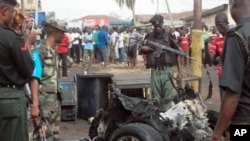Shortly after a car bomb exploded on Easter Sunday in Kaduna, Nigeria, Hafsat Mohamed Baba rushed to the scene to assist with the wounded.
Once there, the opposition politician accompanied an injured 11-year-old girl to a nearby hospital, where Baba saw the bodies of several who had already died.
“There are so many casualties. When I visited the hospital, people were laying on the floor, some were in the [operating] theater, some with their bellies open, intestines out, people were bleeding and the nurses and the doctors were running helter-skelter looking for blood.”
Officials say the bomb outside a church killed at least 20 people.
Baba, a leader in the Action Congress of Nigeria party, said the blast was “in the heart of Kaduna” - her hometown.
“There are people on bikes, there are people in the taxis, it’s a commercial area and there are so many people there - buses coming to drop people and to pick people from the bus stop - it is really a congested area.”
She added the scene at 44 Army Reference Hospital, where many of the wounded were being treated, was chaotic.
“There were so many injured people, actually some very serious,” she said of the scene. “In fact some were even in the [operating] theater,” Baba said. “There were really more than 20… so many people.”
As of late Sunday, no group had claimed responsibility for the bombing, though militant anti-government sect Boko Haram is known for staging large attacks against Christians during holidays. Experts say the Islamist group has splintered into many factions of varying extremism, some of which claim ties to regional Al-Qaeda franchises.
“Yes there are speculations, because for something of this nature, people feel that it is Boko Haram, even though the Boko Haram has not come out to claim the responsibility,” said Baba. “But people are really more concerned about the causalities. A lot of people have lost their loved ones.”
She said the streets of normally lively Kaduna were extremely quiet Sunday night.
“The streets are virtually almost deserted. But you see a few cars. The security has been zipped up really tight,” she said. “People are so moody, especially this festive period, people were not expecting to have anything like that. Actually the whole atmosphere is really that of, people are really disturbed.”
Baba added that Christians and Muslims in Kaduna usually live together in peace.
“Actually there’s harmony between the religions and there’s good understanding,” she said “People engage themselves, both religions, there’s not actually that kind of divide. We work together, we eat together, we dance together, we celebrate together.”
Nigeria’s government has offered cash rewards for information about Boko Haram. However, despite assurances that their cooperation would remain confidential, residents have said they are scared of reprisal attacks.










